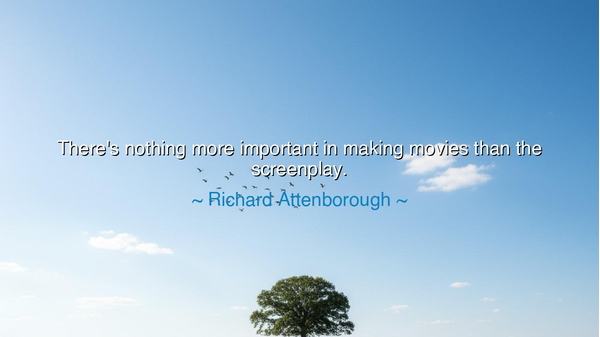
There's nothing more important in making movies than the






When Richard Attenborough declared, “There’s nothing more important in making movies than the screenplay,” he was not offering a casual remark, but voicing the very foundation of the cinematic art. For though lights may dazzle, actors may shine, and directors may command, it is the screenplay—the script, the architecture of story—that gives shape to all these things. Without it, the film is but a hollow vessel, a ship without a map, a body without a soul. His words remind us that the true power of cinema begins not with spectacle, but with story.
The origin of this truth lies in the history of storytelling itself. Long before cameras, long before theaters, humanity gathered around fires to listen to tales told in words. It was not costumes, nor music, nor dazzling illusions that first captured the heart—it was the narrative, the structure of human experience translated into story. When Attenborough, a man who both acted and directed, lifted up the screenplay as supreme, he echoed the wisdom of the ancients: that everything else is an adornment, but story is the foundation.
Consider the tale of Casablanca, a film remembered as one of the greatest in cinema. Its actors—Bogart and Bergman—brought life to the screen, and its direction carried elegance, yet none of these could have endured without the script. The dialogue—“Here’s looking at you, kid”—the pacing, the conflicts of love and duty, were all born of the written word. Even with modest production, the screenplay gave it immortality. It is a clear example that films built on weak scripts, no matter how grand the actors or visuals, falter into obscurity, while those founded on strong writing endure across generations.
The meaning of Attenborough’s words is also heroic: he calls us back to discipline, to the heart of craft. In an age tempted by visual splendor and technological marvels, he reminds us that no amount of spectacle can redeem a poorly told story. To craft a screenplay is to weave human truth into words and structure, to build a skeleton upon which the flesh of the film may rest. The screenplay is not glamorous; it is often written in solitude, without applause. Yet it is the seed from which the forest of cinema grows.
The lesson is clear: honor the foundation before you seek the crown. In art, in work, in life itself, do not be seduced only by the surface—the light, the performance, the final polish. Focus first on the core, the structure, the truth at the center. For just as a film without a strong script collapses under its own weight, so too does any life or project built without a strong foundation. To begin with substance is to ensure endurance.
What, then, should you do? First, if you are a creator, give your labor to the story before you chase spectacle. If you are a dreamer, build your plans on substance, not illusions. Second, remember that true greatness is often forged in the quiet work no one sees—in the draft, the blueprint, the hidden structure. Third, value content over decoration, depth over dazzle, for these are what sustain beyond the passing moment.
Thus, let Attenborough’s words be remembered: “There’s nothing more important in making movies than the screenplay.” They are not only about cinema, but about life itself. For in every great endeavor, there is a script, a foundation, a story to be written before the world can witness the performance. Build yours with care, and when the lights rise and the audience gathers, your work will stand not because it dazzled, but because it was true.






AAdministratorAdministrator
Welcome, honored guests. Please leave a comment, we will respond soon